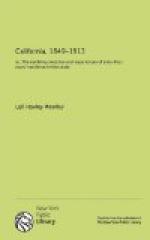“Yes,” said he, “I thought so too; at the same time, I thought I would just step into a faro bank and win just enough to pay my passage home so that I would have even money when I got home. But instead of that I lost every dollar I had and I am going back into the mountains again. My readers know the rest.”
My friends this is only one of thousands who had the same experience.
In 1868 “the girl I left behind me” went East on a visit of six months, taking with her our two children.
In the fall of that year (1868) I went to White Pine in Nevada. It was a very cold trip for me and I came home in June “thawed out,” sold out my grocery business and went into the produce commission business and followed it for ten years.
Martin J. Burke.
Chief of Police Martin J. Burke I knew very well in the early sixties. He was a genial and good natured man, well liked by everybody who knew him. I went to him one time with a curb bit for a bridle which would bring the curb rein into action with only one pair of reins. He was much pleased with it and used one for a long while. George C. Shreve, the jeweler, had one also, as did Charles Kohler, of the firm of Kohler & Frohling, wine men of San Francisco. He offered me $3000 for my right but I refused it. I applied for a patent only to find that another was about twenty years ahead of me.
The Donahue Brothers.
James, Peter and Michael Donahue, the founders of the Union Iron Works on First and Mission streets, were three honorable, upright and just men. Their works have since been removed to the Potrero south of the Third and Townsend streets depot of the Southern Pacific Co., and have of late passed into the hands of the United Steel Corporation. They are the largest of their kind on the Pacific Coast and stand




